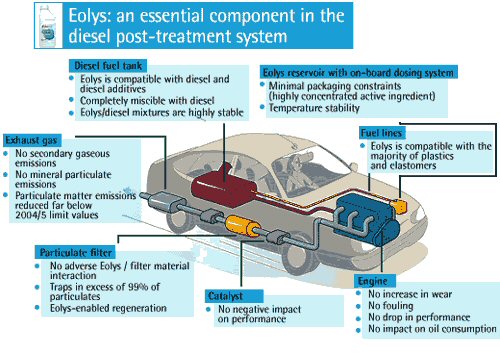Eolys Cerine is an additive mixed with diesel fuel at 0.05% by volume intended to lower the temperature of (re) combustion of particles in the particle filter of vehicles fitted with it.

The user is generally not aware of this additive (filling the Cerine “tank” during the 80 km overhaul accompanied by a forced re-generation of the Particulate Filter if necessary)
Is it this product which is at the origin of the odors of bleach (Chlorine?) Which emanate from recent Peugeot HDI and Mercedes vehicles?
It is a product derived from rare earth (cerium or Ce, cerine is cerium oxide with the formula CeO2) bound by a petrochemical product (Rhodia).
It is probably quite dangerous to handle pure seen the protections required by the maintenance technicians. Moreover this product is quite expensive and recess the responsibility of the driver when maintenance of the vehicle.
In addition, some foreign studies have shown that these filters would in fact release finer particles, much more dangerous for humans because they are invisible and pass more easily into the blood. The largest particles being stopped by our biological filters (mucous membranes, hair, etc.)
Learn More
It has become difficult to find serious information about the Cerine d'Eolys on the internet but here are some interesting documents that we were able to find:



A highly toxic substance. Leaks of DPF additive are not very rare - a real disaster for the local ecology.
The treatment of cerine by small garages leaves something to be desired - sometimes it ends up in nature, instead of being sent to the recycling center.
it's a scandal, an ecological disaster, a time bomb, we're all going to die.